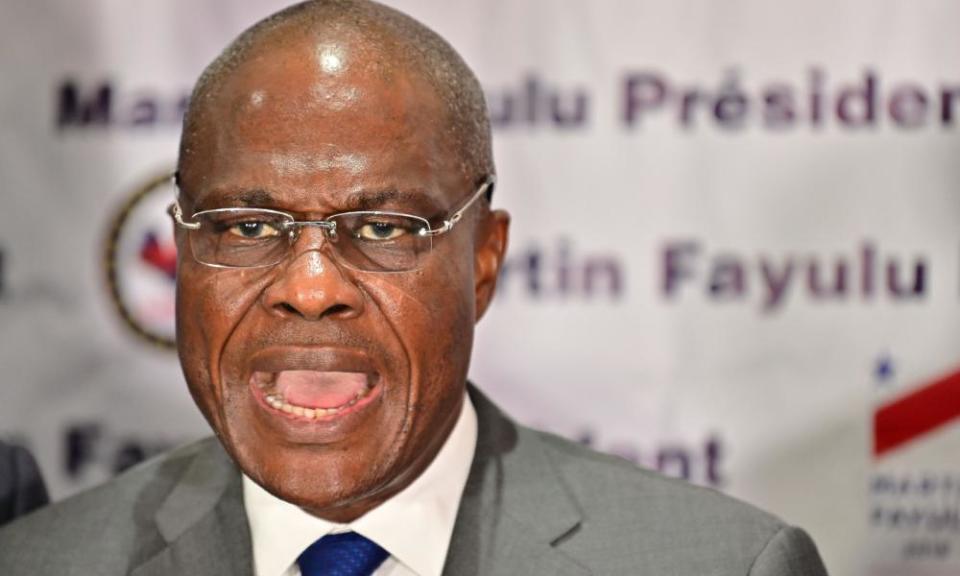DRC opposition urges civil disobedience after election appeal rejected

An opposition politician in the Democratic Republic of the Congo has called on his millions of followers to conduct a peaceful campaign of civil disobedience following the rejection of his appeal against election results by the country’s highest court.
Martin Fayulu said he considered himself the “sole legitimate president-elect” of the country and urged the Congolese people not to recognise “any individual who would claim this authority illegally”.
I now consider myself as the sole legitimate President-elect of the #DRC. Therefore, I ask the Congolese people not to recognize any individual who would claim this authority illegally nor to obey orders that would emanate from such a person. #RDCVote #DRCElections pic.twitter.com/V2UaHm3A8L
— Martin Fayulu (@MartinFayulu) January 20, 2019
The DRC’s constitutional court confirmed early on Sunday morning that Felix Tshisekedi, the leader of the country’s main opposition party, was the winner of the polls that were held after more than two years of delays in December.
Fayulu, who was placed a close second, rejected the provisional official tally released last week, saying it was the product of a secret deal between Tshisekedi and the outgoing president, Joseph Kabila, to cheat him out of a clear win.
Leaked internal data seen by the Guardian from the electoral commission in the DRC and from the influential Catholic church, which deployed more than 40,000 monitors on polling day, appears to indicate that Fayulu won convincingly with about 60% of the votes cast.
Aides to Kabila and Tshisekedi have denied making any deal, though they have confirmed a dialogue.
The influential African Union broke with a long tradition of backing governments in power to implicitly question the results. Experts have described the usually conservative AU’s appeal for the final results to be delayed as “incredible”.
On Sunday, the Southern African Development Community, which had previously appeared sceptical of the results, issued a statement to congratulate Tshisekedi on his victory.
Officials in Kinshasa suggested that Tshisekedi, who inherited the leadership of the Union for Democracy and Social Progress when his father died in 2017 and has not previously held senior office, may be inaugurated as president as early as Tuesday.
Such a swift inauguration would be a gamble that might further destabilise the DRC, intensifying the sporadic unrest in which 34 people have already been killed, 59 wounded and 241 “arbitrary arrests” made in the past week, according to the UN human rights office.
However, it is unclear whether Fayulu, who has tapped into a deep anger among ordinary people at the behaviour of a corrupt and incompetent elite, can mobilise a broad-based campaign of civil resistance. Though respected, the former business executive turned parliamentarian lacks the nationwide organisation of Tshisekedi.
Analysts say most of the security establishment remain loyal to Kabila.
Tshisekedi said on Sunday the court’s decision confirming him as the winner of the presidential election was a victory for the entire country.
“It is Congo that won,” he said, speaking to his supporters. “It is not the victory of one camp against another. I am engaged in a campaign to reconcile all Congolese ... The Congo that we are going to form will not be a Congo of division, hatred or tribalism. It will be a reconciled Congo, a strong Congo that will be focused on development, peace and security.”
The poll was meant to enable DRC’s first democratic transfer of power in 59 years of independence from Belgium.
The government spokesman Lambert Mende said by telephone that the ruling party had “taken note” of the court decision. “Felix Tshisekedi will become the fifth president of the republic,” Mende said.
Senior officials known as loyal to Kabila have indicated their willingness to work with Tshisekedi.
“I reiterate my congratulations ... and ask the population to allow this first transition of power to take place in peace. Long live democracy,” Julien Paluku, the governor of the restive eastern province of North Kivu, said on Twitter.
DRC’s constitutional court is widely seen as loyal to Kabila, who has been in power since his father was assassinated in 2001.
Reports suggest that internet service in the DRC has returned, 20 days after it was cut off following the elections in what appeared to be an attempt to dampen speculation about the presidential election results and hinder organisation of protests.
Fayulu has called on the international community to reject the poll results. “I ask the entire international community not to recognise a power that has neither legitimacy nor legal standing to represent the Congolese people,” he said.

 Yahoo News
Yahoo News 